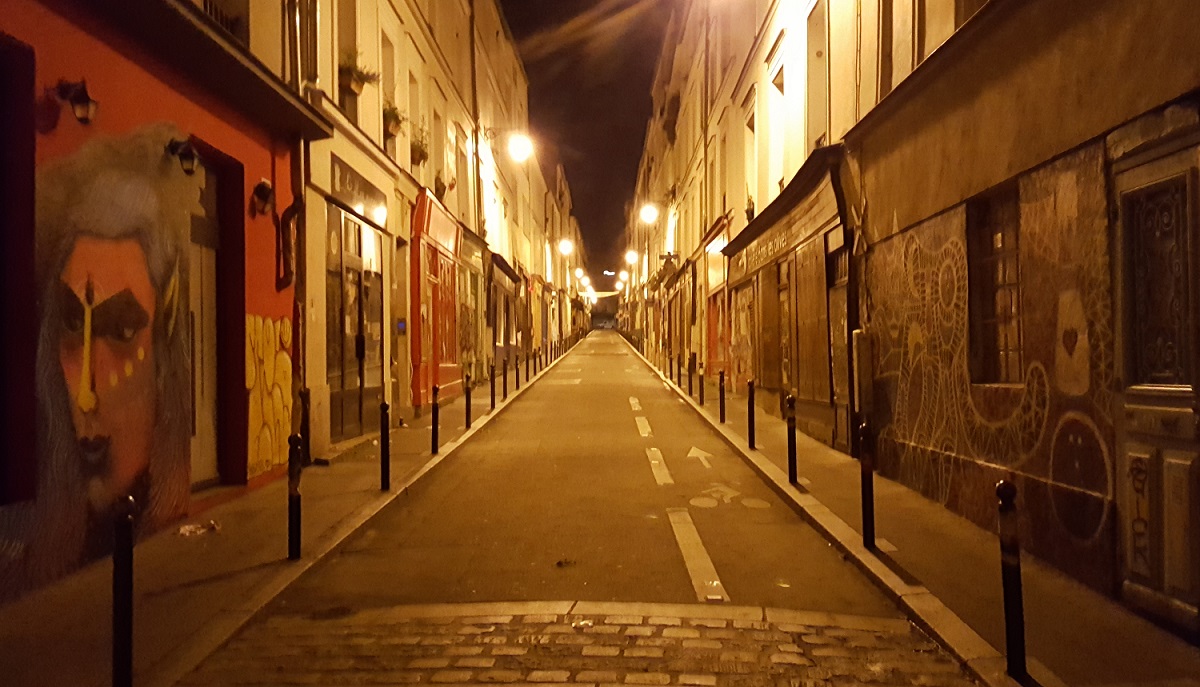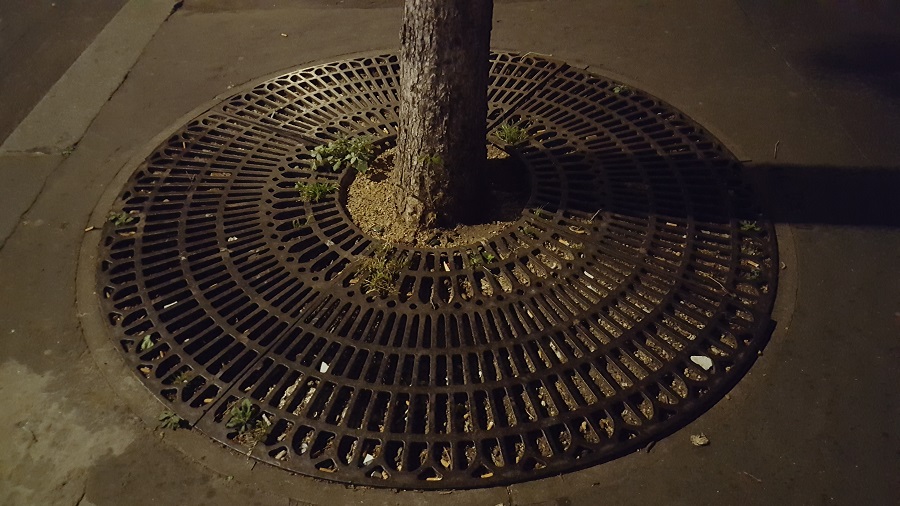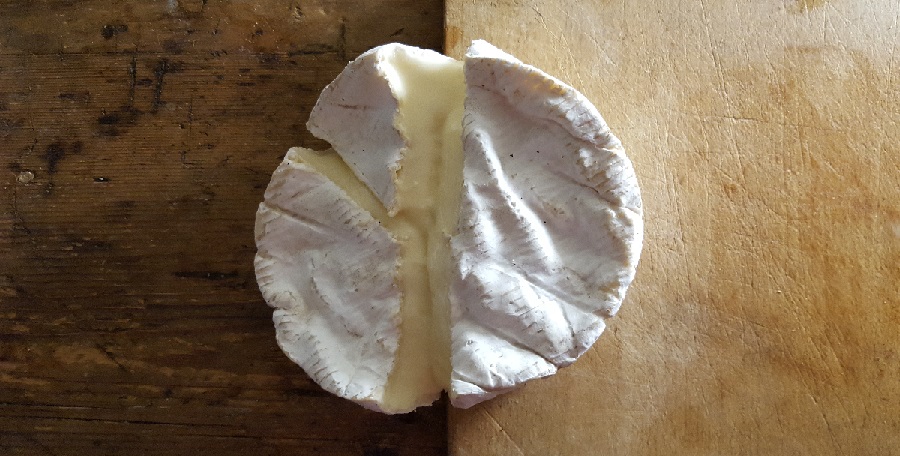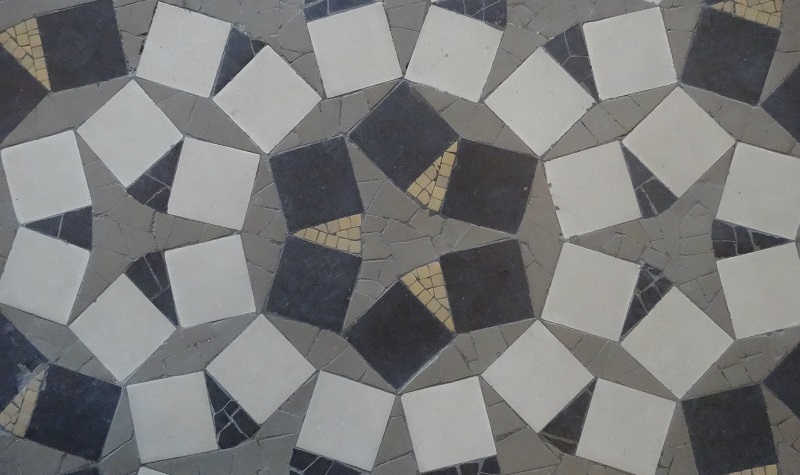
… live in Paris anymore. You no longer live in the French capital, on the Right Bank or the Left, or in any arrondissement or quarter.
You now live at the center of a nameless territory with a radius of one kilometer, legally circumscribed by coronavirus confinement. If you were to give that territory a name, it would be your own, as noted on the form that the roaming border police may ask you to produce to explain your reason for not staying at home.
You might call where you live a neighborhood. But neighborhood implies that others share a similar sense of its borders. Under the circumstances, that would apply only those who live at your address, i.e. in your building, with the same legal radius of movement, along with the man who sleeps beneath the awning of the shuttered restaurant downstairs, were he to note that as his address, which he wouldn’t. Or, if neighborhood this is, then it’s a quiet neighborhood with lots of joggers, lots of pigeons, a few ducks, and a fine selection of bread, cheese, produce and meat products.
You might call where you live a community. But a community would have a common characteristic or shared interest that would differentiate yours from other communities. Or, if community this is, then what it shares is relative financial security and a belief that some other community will service its shops, remove its garbage and feed its homeless. It would be a community whose members acknowledge each other’s presence just two minutes per day, when applauding medical workers from their windows and balconies, before closing their curtains.
You might call where you live a village. But a village would have a place of worship, a square, a municipal building or a commercial street at its center, and boulevards, parks, mansions or monuments at its borders, and perhaps a canal or river as its edge. Or, if village this is, then it’s one with no history to celebrate, no idiot or sage, and if someone were to ask where you live in this village you would answer, as the other villagers do, that you live in the center.
You might call where you live a bubble. But a bubble sounds light, hollow, unhinged and unstable. Or, if bubble this is, then it’s one created by the second best forms of social distancing: seeking out useful information minimally, heeding current events frugally, and sucking on social media sparingly. And it would be like a bubble in a glass of champagne, one of more than a million, in a glass served in an international toast to good health.
If you still lived in Paris, you would say that you live in a time zone designated as GMT+2. But where you now live you’ve little use for a numerical notion of time. The baker does, the cheesemonger does, the pharmacist does, the stock broker does. But you now live on your own meridian, neither plus nor minus, with little reason to check the hour.
Where you now live, time is divided into two parts that ease one into the other: one part under a lighter sky, the other part under a darker sky. You’re equally at home in both the shifting brightness of the one and in the calming constancy of the other. You have no need to interpret them as the God of the Bible did when he “called the light ‘day,’ and the darkness he called ‘night.’” You don’t need a name for them any more than you need to call what you set out to do “project,” what you accomplish “productive,” what you exchange “conversation,” and what you now give to the man beneath the awning “charity.”
You don’t need a clock to know that it’s 8PM because that’s when the applause, that you may or may not take part in, starts. You don’t need a clock when, at sundown, a police car making drive-by rounds slows at the end of the street and a policeman inside draws down a window and tells the men who gather to drink wine and tall beers at the corner to break up the party and go home. Like teenagers, the gathering men complain a bit, but as the tone of the order rises they do as they’re told.
When you do check the digits of time, it’s to note them on your signed declaration indicating the who, why and when of an excursion into your namesake territory. An annoying reminder of constraint, yes. But, while you’ve been asked to produce your form under the lighter sky, you’ve never been stopped under the darker. As you put on your jacket and shoes for the latter, the outing feels venturesome, nearly clandestine. Then, once on well-lit streets, you feel curious and free. Here and there you pass a man with his dog, a jogger, a still or sleeping figure beneath a bus shelter, or a wanderer whom you recognize as neither friend nor foe but simply another.
You’re free of Paris, that place where you no longer live. Yet you’ll hear and read some people claiming that they still do. Grandstanding, they are, as they make declarations about “Paris” and “Parisians,” as if they’d been tasked with translating the philosophical or psychological or emotional state of the inhabitants of a zone designated on a map as Paris.
They will say that Paris is dormant or veiled or abandoned to nature. But Paris isn’t sleeping; Paris isn’t hidden; Paris isn’t empty. Paris does not exist. The birds you hear don’t live in Paris, they just live, with fewer other sounds to interrupt their questions. One grandstander wrote that the quiet of the monument-dotted Paris where he claims to live is reminiscent of the German Occupation. He must have been reminiscing about the life of a collaborationist, because for most others Paris also ceased to exist during the Occupation.
You wonder how journalists even manage to find Parisians to observe or interview because there are none where you now live. Parisians dress more fashionably than the people you see. Parisians smoke more and they jog less than these people who pant by you in stern prayer of good health. Parisians stand talking to each other in the middle of the sidewalk without moving until you ask them, not like these people who make room for you to pass. Parisians cut in line, unlike these people queuing a meter apart. Parisians take turns going outside with their children, not in couples like the people you see. Parisians enjoy going out after dark—they don’t turn off the lights at nightfall. Parisians flirt, Parisians are snobs, Parisians ride scooters into their 50s. These can’t be Parisians. How could they be when they don’t live in Paris any more than you do?—though many may wish they did.
Do you?
Well, you have many fond memories of Paris. Paris has taught you much: about language, culture, cuisine, wine, history, Catholics, Algerians, Muslims, Sephardim, atheists, intellectuals, Revolution, art, pigeons, cats, politics, friendship, sex, taxes, health care, love, age, death, and certainly more. You remember the way you moved from her periphery to her core.
But you no longer need Paris to reap the intellectual riches that you’ve sown, nor to enjoy the relationships that you’ve developed. You’re nearly relieved to no longer live there. What could be more satisfying than to live in this–your—place and time? What could be more fulfilling than being where you are, both connected and individual, collective and unique, part of a vast historical-cultural-eco-bio-system and alone with these thoughts?
Sometimes you miss Paris, though not for long—because this place where you now live is so true to who you are and you are so central to its life that if anything is now missing it would be something much larger or more intimate than Paris. And knowing that, you resolve to not return to Paris when quarantine ends, but to stay right where you are, centered.
Text and photos © 2020, Gary Lee Kraut
Gary Lee Kraut, editor of France Revisited, leads the Paris Vignettes Writing Workshop, an international workshop that meets weekly via Zoom. Workshop participants work on short texts, both fiction and nonfiction, not necessarily about Paris. Texts may be part of a longer work (memoir, short story, personal essay, novel). Current participants join from France, the United States, Canada, England and Israel. For details, contact Gary directly at gary [at] francerevisited.com .





Oh, that was good … and new and refreshing and validating! Thank you for expressing “it” so well. May we all be so well at the centers of our own little universes! Warm regards, Anna
Gary, this is an exquisitely written piece. It’s such a great portrayal of the times from a unique perspective. No one is sure exactly where they live anymore. Contains action, adventure and insights across all of society…and it’s about Paris one of the most famous cities in the world. I can recall every scene even the bubbles in the champagne allegorically discussing the bubble you’re living in. The pictures added a lot. It was a very visual experience for me. I can see the beer drinkers out being sent home. I can see the empty streets as well as the people coming out on their balconies to applaud the medical personnel, the people on the paths now parting for the runners. The picture of the empty street is haunting to me, a revisitor to Paris. You accurately, creatively exposed the surreality of the time. It’s an important piece. Bravo!
Thank you, sir, for this essential reading about how we relate to where we live, wherever that may be (or have been). It would be a better world if more of us felt so centered.
Richard (who doesn’t live in New York anymore),
Thank you, sir, for your kind comment. And thank you for allowing me to post the message that you initially sent privately. Much appreciated.
Gary
Wow, beautifully written!
I am in awe about your eloquent piece.
I was born there, unfortunately not living there anymore, but for a few minutes I was there again as I was during the german occupation. Bravo Monsieur Gary Lee Kraut.
Merci Françoise. Much appreciated. Gary
Love your work; I left Paris in November 2019 and can say that there are times when I miss it dearly and other times when I do not. Living in Paris changed me for the better as a person and one day I will return.
This is so well written!